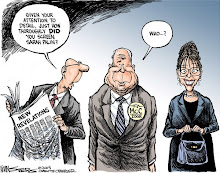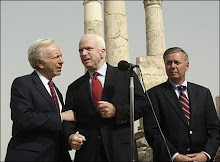By MIKE GLOVER, Associated Press Writer Wed Aug 6, 4:38 AM ET
DES MOINES, Iowa - Republican presidential candidate John McCain opposes the $300 billion farm bill and subsidies for ethanol, positions that both supporters and opponents say might cost him votes he needs in the upper Midwest this November.
His Democratic rival, Barack Obama, is making a more traditional regional pitch: He favors the farm bill approved by Congress this year and subsidies for the Midwest-based ethanol industry. McCain instead has promised to open new markets abroad for farmers to export their commodities.In his position papers, McCain opposes farm subsidies only for those with incomes of more than $250,000 and a net worth above $2 million. But he's gone further on the stump.
I don't support agricultural subsidies no matter where they are," McCain said at a recent appearance in Wisconsin. "The farm bill, $300 billion, is something America simply can't afford."McCain later described the measure, which is very popular throughout the Midwest, as "a $300 billion, bloated, pork-barrel-laden bill" because of subsidies for industries like ethanol.
It's not a stand that pleases Republican Sen. Charles Grassley of Iowa.
"I would not advise him to take that position," Grassley said. "For sure, he can't lose Missouri and that's in the upper Midwest. Could he lose Iowa, Minnesota and Wisconsin and still be elected president? Yes, but I wouldn't advise him to have that strategy."
Grassley, a conservative Republican, and his Senate colleague from Iowa, liberal Democrat Tom Harkin, have achieved enduring success in this state largely by mastering the politics of farm issues. Harkin chairs the Senate Agriculture Committee, which wrote the new farm legislation.
"I don't see any scenario in which McCain can get to the White House without carrying some upper Midwestern states," said Harkin, an Obama backer. "I've never really understood in all my years why Sen. McCain has gone out of his way to speak against and vote against policies that are important to the upper Midwest."
There's a history of close elections in the region. President Bush carried Indiana, Iowa, Missouri, North Dakota and South Dakota in 2004, earning 35 electoral votes. But his Democratic opponent, John Kerry, prevailed in Minnesota, Wisconsin and Illinois, giving him 41 electoral votes.Veteran GOP strategist Gentry Collins said McCain can defend his record on farm issues, including opposing "corporate welfare" for big operations, but he said there's more at work.
"The upper Midwest is crucial in this election, and Midwestern voters value authenticity. They value experience," Collins said. "I don't think agricultural issues are the only issues Midwestern voters care about. There are some bigger-picture issues, broader issues where he's strong."
But on another important issue to Midwesterners, McCain opposed a tax break for developing wind power. Obama supported the tax break.
"We're employing close to 2,000 people right now in Iowa in the wind energy industry," Harkin said.
McCain has been most outspoken on ethanol subsidies, and that has Republicans worried in Iowa, the nation's biggest producer of the fuel. Other top ethanol producers include Illinois, Minnesota, Indiana, Ohio, Wisconsin and Missouri."It does challenge him in states like Iowa, the No. 1 ethanol state," said Bill Northey, Iowa's Republican agriculture secretary. "It does make it tougher to make the case."
Drake University political science professor Dennis Goldford said McCain's problem on farm issues reflects a deeper issue he faces as he's courted conservative GOP activists, many of whom are deeply suspicious of him."He's essentially reverting to standard Republican supply-side economics," said Goldford. "That's where he's got a problem. He's got to find his own voice and so far he hasn't had a voice."
Iowa Gov. Chet Culver, a Democrat who has campaigned for Obama, said he's puzzled by McCain's position. He points to other Republicans who have a different view. "President Bush and I just had a good conversation about how critically important ethanol is, and how Iowa is positioned so well to lead the nation," said Culver. "I have no idea why John McCain doesn't support it. It hurts him in Indiana, and Missouri and Ohio, and it's not the message right now that any of us want to hear."
Obama has a modest lead in national polls, but electoral votes will decide the election. Obama is poised to do well on both coasts, while McCain is favored in the South and some parts of the West. That leaves the upper Midwest as a swing battleground. "The Midwest is crucial in this campaign," said Iowa Attorney General Tom Miller, a Democrat and an early backer of Obama. "Iowa, Minnesota, Wisconsin and perhaps Indiana are very important states. McCain is behind, and he's in danger of falling further behind."
Subscribe to:
Post Comments (Atom)




No comments:
Post a Comment